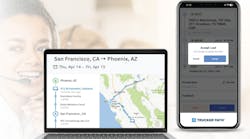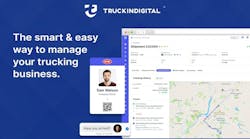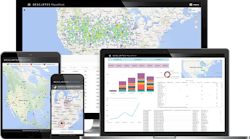BOCA RATON. According to Gov. Bill Graves, president & CEO of the American Trucking Assns.(ATA), a poll done in June indicates U.S. voters are most concerned about jobs and economic growth, followed by the oil spill in the Gulf of Mexico, the federal deficit, the wars in Iraq and Afghanistan, national security and terrorism, health care and social issues.
Graves, the keynoter for the annual PeopleNet User Conference being held in Boca Raton, FL, this week, spoke to a packed ballroom of some 500 attendees about the issues facing trucking and the country as a whole as the mid-term Congressional elections approach.
As for the trucking industry specifically, Graves said ATA is currently most concerned with CSA 2010; possible changes to the hours-of-service regulations; distracted driving; re-authorization of Highway Funding; proposed fuel economy standards, and various labor initiatives.
“We have been embracing CSA 2010,” said Graves. “If it is done properly, it will help us get bad actors off the road. It is the right thing to do and we wanted to be on the right side of this issue.” . Remarking on the public perception of trucking when it comes to safety, he added, “It is sure hard to change old images of trucking, though.”
Graves said that ATA was also concerned about some individual aspects of CSA 2010, including accident accountability provisions, which treat at-fault accidents and unpreventable accidents the same when it comes to scoring. ATA is also keeping a close eye on how warnings and actual citations are regarded under CSA 2010. Right now, these are also given equal weight.
“FMCSA (Federal Motor Carrier Safety Administration) has agreed to modify CSA 2010 somewhat,” Graves noted, “and on August 16, all carriers will finally have access to FMCSA’s safety numbers for their fleet under CSA 2010. That is when I expect our telephones at ATA will really start ringing.”
Turning to hours-of-service regulations, Graves said that he was concerned that the current rules might change again. “The proposed rule is over at the Office of Management and Budget now,” he said. “About November 1, we will know for the first time what that proposed rule will be. I am concerned that it will change, even though the [accident] numbers have been good and improving under the current system.”
Some citizen groups have been advocating for reducing work hours to eight hours a day instead of eleven and moving the reset from 32 hours to 40, he added. “Congress has no control over this. It is all in the hands of the Agency,” Graves said.
“I think we may have made a strategic error in not supporting electronic logging more aggressively,” he continued, “so that we could have used that to help make the case for sustaining the current hours-of-service rules. We know that EOBRs [electronic onboard recorders] will be mandated for everyone. It will happen; it is just a case of when.”
“Distracted driving is [Secy. of Transporttaion] Ray LaHood’s number-one priority now, however,” Graves said, noting that while the ATA supports a ban on texting, the worry is that distracted driving initiatives “might go too far.” “We know how important in-cab communication is to the trucking industry,” he said.
Reauthorization of funding to maintain the nation’s roads and bridges is “going nowhere fast,” Graves observed. “We worry about what will happen if the federal government fails to act,” he added, noting that states might step in to take up the slack and end up creating a patchwork quilt of programs to support highways within their own states.
When it comes to new fuel economy standards for commercial trucks, Graves acknowledged that it “is probably the right thing to do.” He cautioned, however, that it will, at least initially, increase costs for the trucking industry.
Another place where trucking could be adversely impacted is in the area of labor, according to Graves. He noted that the card-check measure that would make it easier for unions to attempt to organize workers within companies “has not necessarily died.” Neither has the Nadler Bill, he said, which would permit states and local units of government, such as ports, to set limits on commerce, effectively carving out protections for certain unions.
Graves also looked ahead to the November elections and noted “This election is a big deal.” If Republicans assume more senate seats, he said, “it is really good news for business because it will force the President to actually reach across the aisle like he said he would. It might even allow him to get reelected,” Graves added, “which I do not think he would be today.”
He concluded by noting that “the technologies you are deploying are tremendously important because we are an industry that is going to continue to be squeezed.”
It is a message that is reverberating throughout the conference, which runs through August 11. In fact, PeopleNet CEO, Ron Konezny, opened a general session with a similar message-- a positive look at what technology can mean to fleets. “Technology can really pay off for you,” he told the attendees, noting that trucking is currently operating in a “hyper-regulatory environment.”
Konezny encouraged fleets to be proactive about exploring new technologies while avoiding the here-today-gone tomorrow products that may not endure long enough for companies to realize a good return on their investments.
His to-do list for fleets included:
- If you don’t have a back office system, get one.
- Leverage data to push fuel efficiency because the price of fuel over the long term will only go up.
- Identify value drivers.
- Consider using electronic logs if you don’t already. “About 50% of PeopleNet’s current customers already use electronic logs,” Konezny said. “Get on top of this. Get your drivers comfortable with electronic logs before they are mandated.”
For his own company, Konezny also had a to-do list. “Our number-one objective is to satisfy our existing customers,” he said. “We also have got to continue to innovate.” Other PeopleNet objectives are to continue to develop truly integrated partnerships; to maintain profitable, managed growth; and to attract and retain talented people




